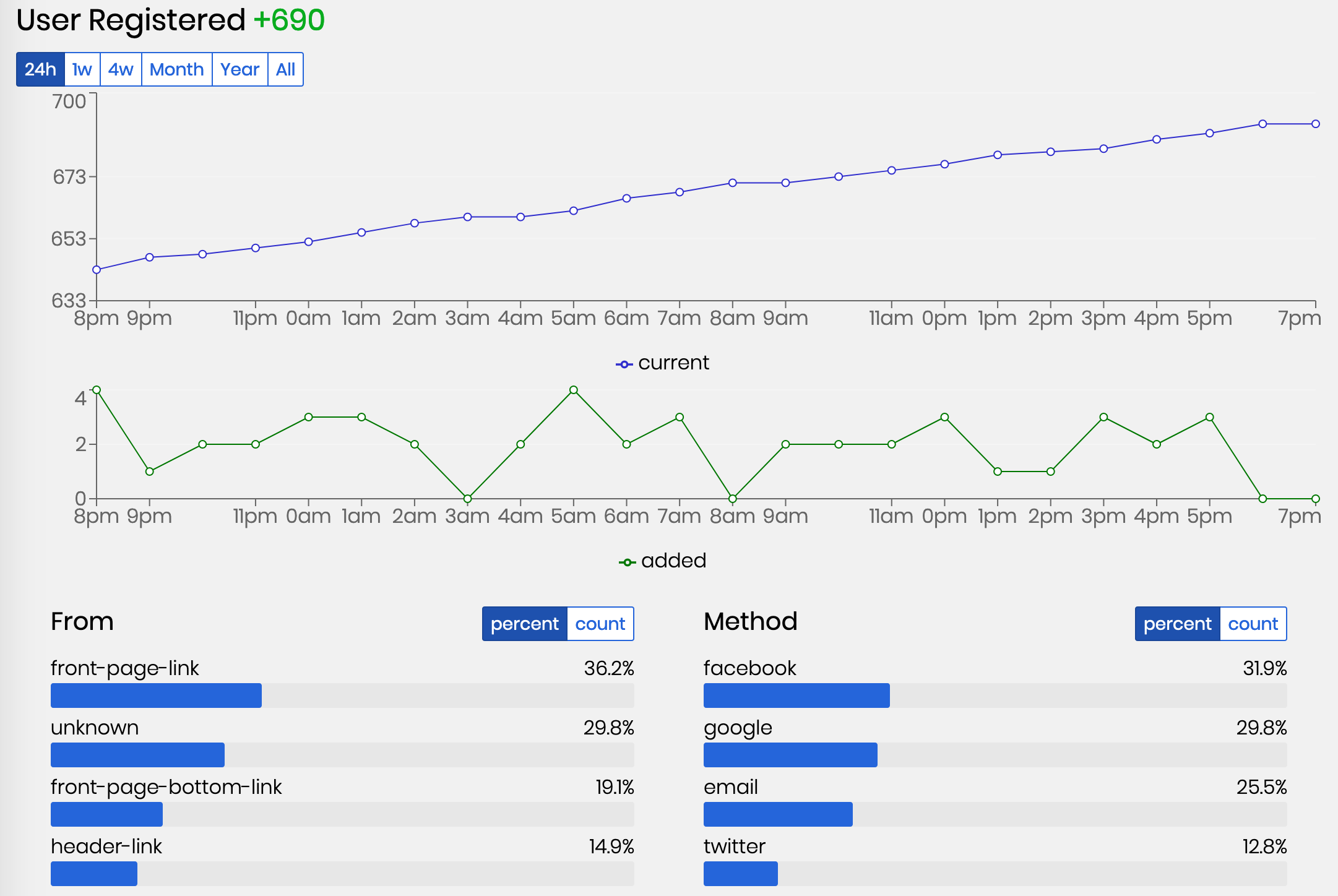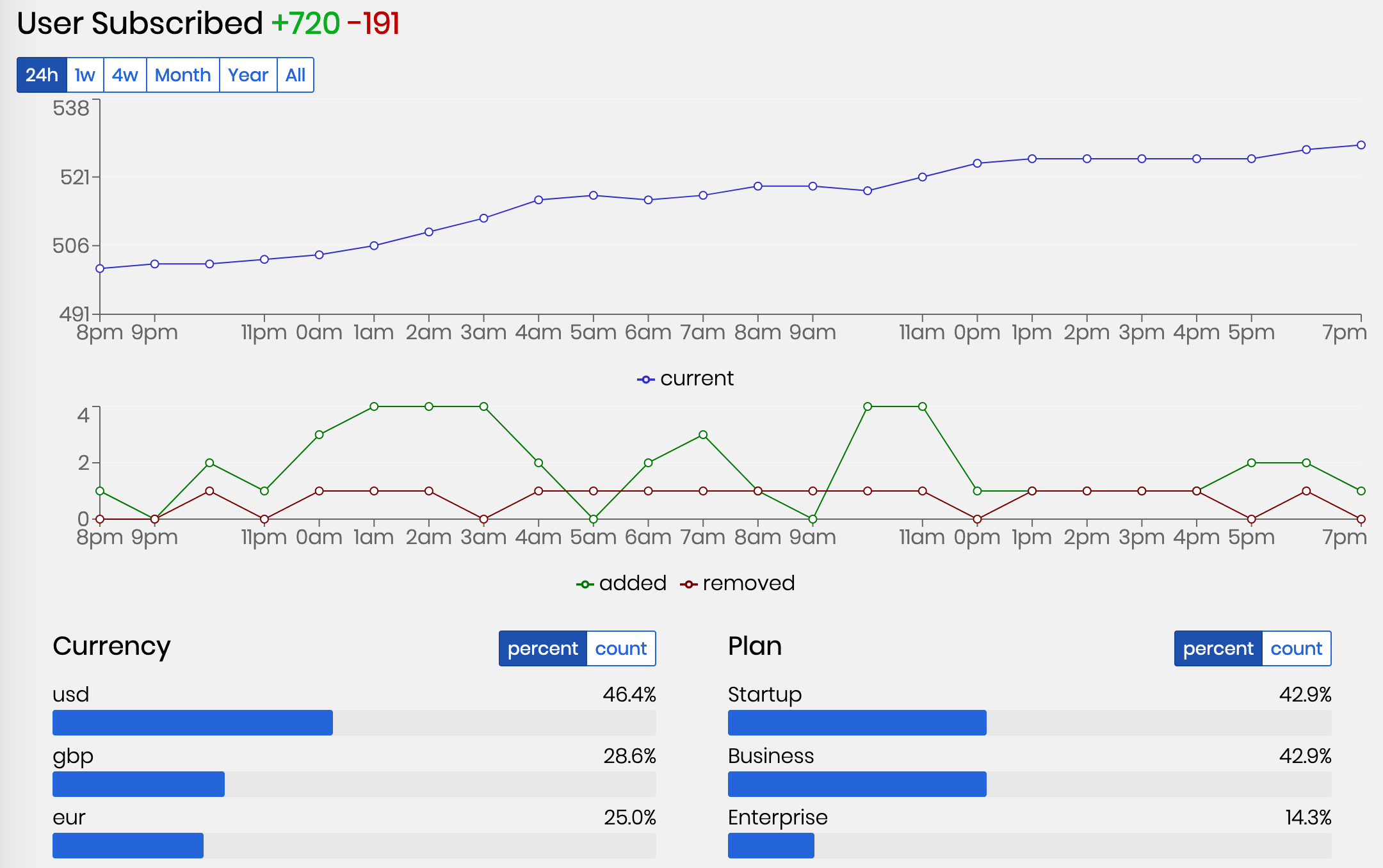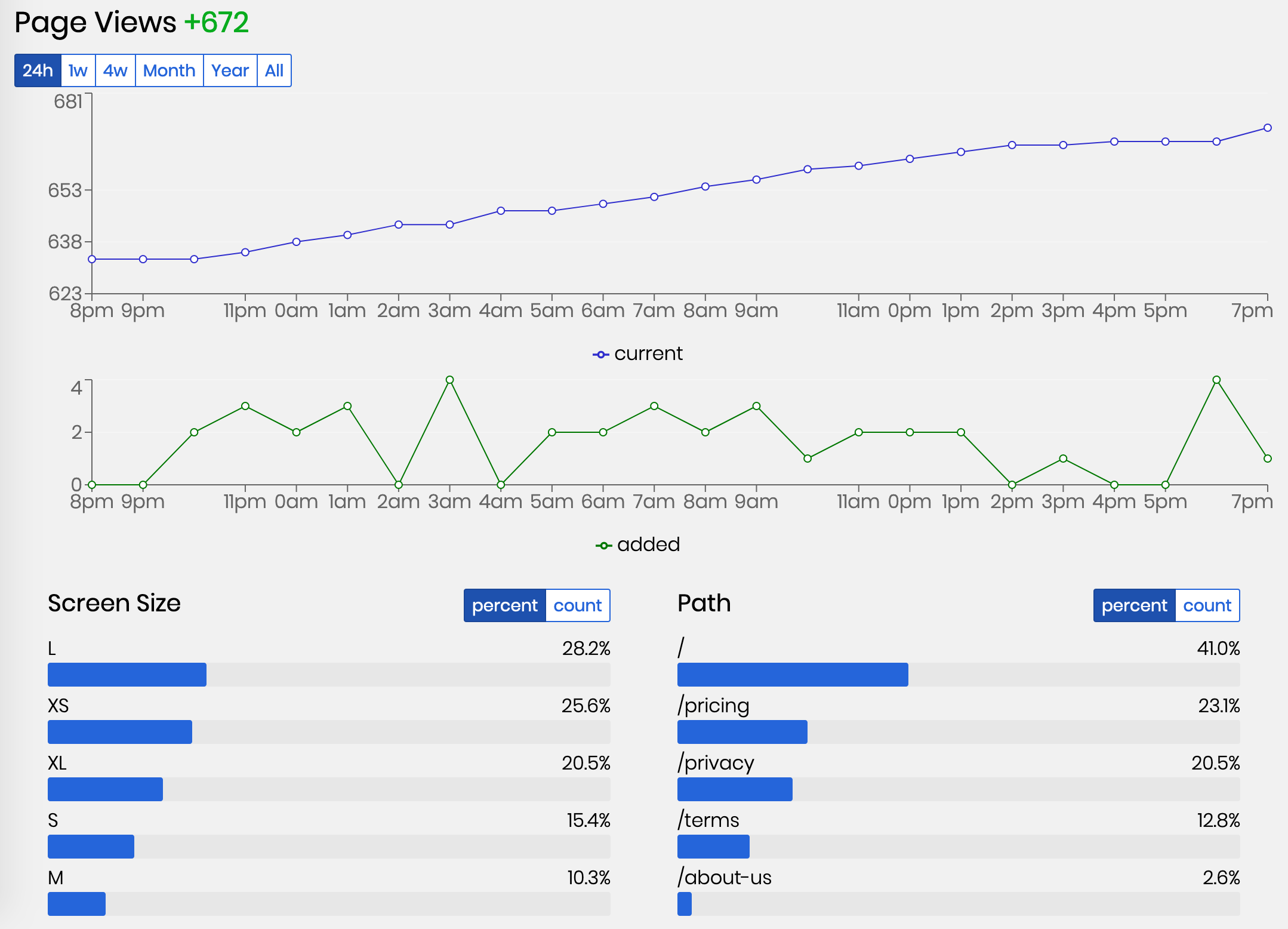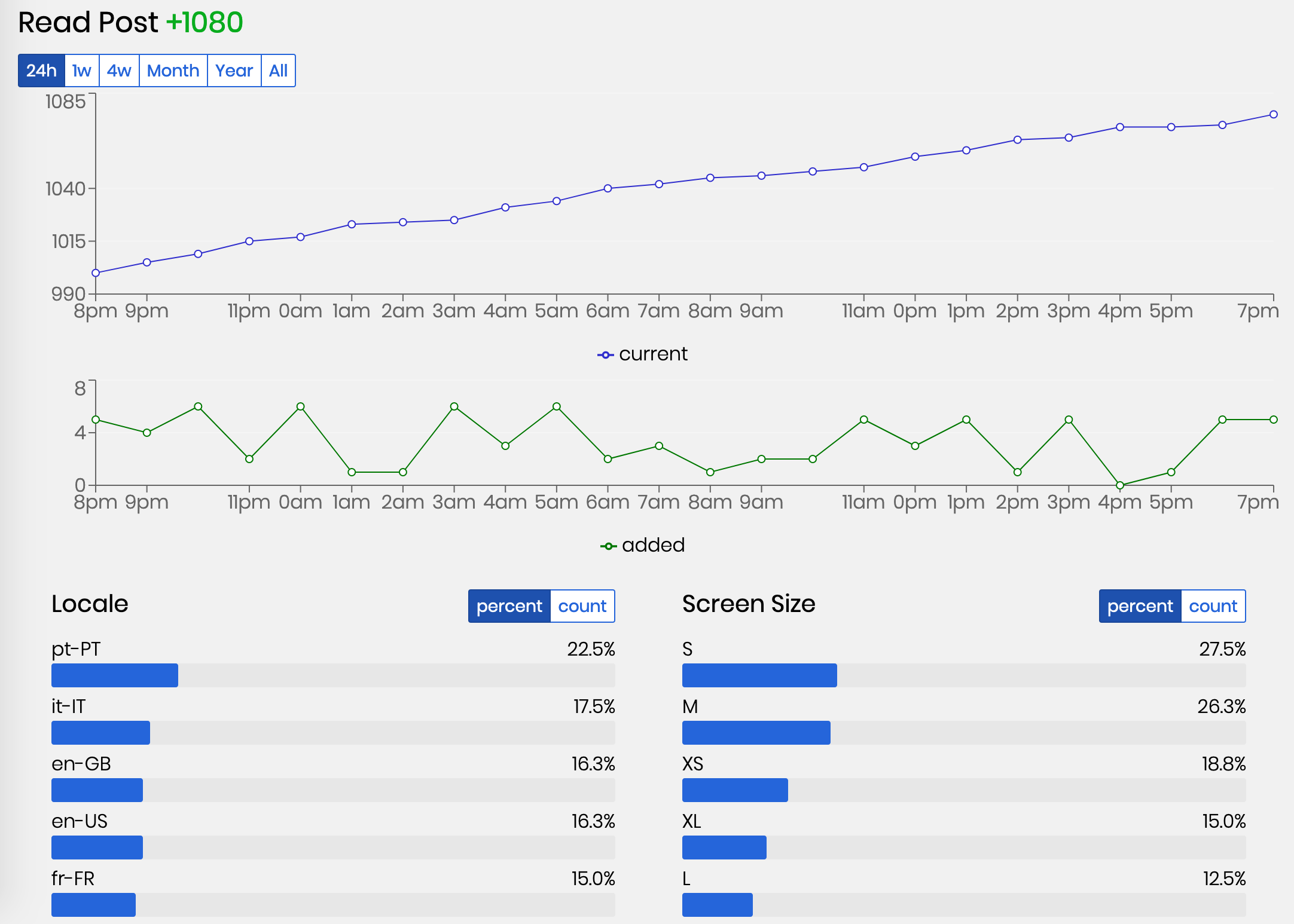Insights-js
This repository contains the official javascript wrapper for https://getinsights.io.
This library allows you to track events in the browser and see them aggregated in our admin interface.
Getting Started
With npm or yarn:
You can just install from npm or yarn, typescript definitions are included in the base package:
npm install insights-jsThen import as a commonjs module:
const { init, track, parameters } = require("insights-js")Or as an es6 module:
import { init, track, parameters } from "insights-js"And track something:
// Initialize for your project, you can find this on your dashboard
init("XkJsfa5KasGf9W_8")
// ...
// track something
track({
id: "user-subscribed",
parameters: {
plan: "Startup",
},
})With the umd build
<script src="https://unpkg.com/insights-js"></script>
<script>
// Initialize for your project,
// you can find this on your dashboard
init("XkJsfa5KasGf9W_8")
// ...
// track something
track({
id: "user-subscribed",
parameters: {
plan: "Startup",
},
})
</script>Guides
Tracking simple events
Just call track()
track({
id: "user-registered",
parameters: {
method: "google",
from: "top-link",
},
})Here is the result in the dashboard:

Custom parameters
insights-js ships with multiple built-in parameters, to track values that are often useful, use as follow:
import { parameters } from "insights-js"
track({
id: "read-post",
parameters: {
// this will track the locale of the user, useful to know if we should translate our posts
locale: parameters.locale(),
// this will track the type of screen on which the user reads the post, useful for useability
screenSize: parameters.screenType(),
},
})See the full list in the parameters'API documentation.
Untracking events
Certain events last through time and may be undone or cancelled after they have been logged. For example, when tracking subscription to services or people.
For these events, it is very useful to be able to know:
- When an event is tracked
- When an event is marked as cancelled
- The current number of active (
tracked - cancelled) events
When this flag is set to true, the given event is marked as cancelled.
e.g:
// A user just subscribed!
track({
id: "user-subscribed",
parameters: {
plan: "Startup",
},
})
// A user unsbubscribed.
track({
id: "user-subscribed",
parameters: {
plan: "Startup",
},
remove: true,
})Here is the result in the dashboard:

Tracking page views
insights-js provides an automatic way of collecting page views, just call the trackPages() function:
trackPages()This function tracks the current page then listen for URL changes and track any subsequent page views. You may configure its behaviour by passing an options object.
Important note on bounce rate and unique views:
This method does not store any cookie or local storage, it expects that you use a client-side router.
e.g. react-router, nextjs's router, etc...
The bounce rate and unique views will not be accurate if you do not use a client-side router,
in these cases, user trackPages(false) to disable tracking of the bounce rate and unique page views.
By default, does not track the location.hash nor the location.search.
Here is the result in the dashboard:

Tracking on multiple projects
The calls to init() and track() are wrappers are methods on the App class.
You may instantiate any use one app per project - with or without the default App:
import { App } from "insights-js"
// equivalent to init("project-1-id")
const app1 = new App("project-1-id")
const app2 = new App("project-2-id")
// will show up in project 1's dashboard
app1.track({
id: "user-registered",
parameters: {
method: "google",
from: "top-link",
},
})
// will show up in project 2's dashboard
app2.track({
id: "read-post",
parameters: {
// this will track the locale of the user, useful to know if we should translate our posts
locale: parameters.locale(),
// this will track the type of screen on which the user reads the post, useful for useability
screenSize: parameters.screenType(),
},
})API
See the detailed API documentation in the docs folder.
init(projectId, options)
init(projectId: string, options?: InitOptions): voidarguments
projectId: string
Mandatory
The projectId to track this event with, you can find this in the page of your project
options?: AppOptions
Optional
Default value: {}
options.disabled: boolean
Optional
Default value: false
When set to true, all calls are disabled.
This flag is useful to disable the tracking based on the environment or URL.
track(event)
track(event: Event): Promise<void>arguments
event: Event
Mandatory
The event to track
event.id: string
Mandatory
The id of the event to track, should be a human readable id in kebab-case.
event.parameters: { [key: string]: string }
Optional
Default value: {}
A map of (key: string) -> (value: string) pairs.
Getinsights keeps track of the number of events logged for each value.
You may also use the parameters variable to generate built-in values.
See the full list in the parameters'API documentation.
event.unique: boolean
Optional
Default value: false
When true, check if a similar event (i.e. same id & same parameters), has already been logged with the unique flag in this session.
If a similar event has already been logged, it skips it.
event.update: boolean
Optional
Default value: false
When true, only update the counts of the parameters, not the count of the event.
event.remove: boolean
Optional
Default value: false
Certain events last through time and may be undone or cancelled after they have been logged.
For example, when tracking subscription to services or people.
For these events, it is very useful to be able to know:
- when an event is tracked
- when an event is marked as cancelled
- the current number of active (
tracked - cancelled) events.
When this flag is set to true, the given event is marked as cancelled.
Examples:
import { track, parameters } from "insights-js"
// user signed up with their email/password
track({
id: "user-signed-up",
parameters: {
provider: "email",
},
})
// user signed up with facebook
track({
id: "user-signed-up",
parameters: {
provider: "facebook",
},
})
// a product was sold
track({
id: "product-sale",
parameters: {
product: product.name,
currency: customer.currency,
},
})
// a page was opened
track({
id: "open-page",
parameters: {
path: parameters.path(),
screenType: parameters.screenType(),
referrer: parameters.referrer(),
},
})
trackPage(options)
trackPage(options?: TrackPageOptions): TrackPageResultarguments
options: TrackPagesOptions
Optional
Default value: {}
The options to configure the behaviour of the tracking, namely:
- wether or not to track the hash portion of the URL (defaults to
false) - wether or not to track the search portion of the URL (defaults to
false) - wether or not to track unique page views as well (defaults to
true)
options.hash: boolean
Optional
Default value: false
true to also track the hash portion of the URL.
options.search: boolean
Optional
Default value: false
true to also track the hash portion of the URL.
A unique page view being defined as the first page tracked in the current session (subsequent pages tracked are not unique).
returns
An object of the form { stop(): void } to cancel page tracking if needed.
Parameters
parameters.locale()
Gets the locale of the current user, for example: en-US, pt-BR or fr-FR.
parameters.screenType()
Gets the type of screen the user is currently on, possible return values:
-
"XS"ifscreen width <= 414px: Mobile phone -
"S"ifscreen width <= 800px: Tablet -
"M"ifscreen width <= 1200px: Small laptop -
"L"ifscreen width <= 1600px: Large laptop / small desktop -
"XL"ifscreen width > 1600px: Large desktop
parameters.referrer()
Gets the referrer of the user.
For example "https://google.com" if the user came from Google.
parameters.path(hash, search)
parameters.path(hash?: boolean, search?: boolean)Gets the current path (segment of the URL after the domain) of the user.
hash?: boolean
Optional
Default value: false
When true, also returns the hash segment of the URL.
search?: boolean
Optional
Default value: false
When true, also returns the search segment of the URL.
parameters.transition(previous, next)
parameters.transition(previous: string, next: string)Gets a parameter value that represents a transition between 2 states.
previous: string
Mandatory
The previous state.
next: string
Mandatory
The next state.
parameters.durationInterval(durationMs)
parameters.durationInterval(durationMs: number)Categorizes a given duration in possible intervals and return the interval:
-
"< 5s"for durations less than 5 seconds -
"< 15s"for durations less than 15 seconds -
"< 30s"for durations less than 30 seconds -
"< 1m"for durations less than 1 minute -
"< 5m"for durations less than 5 minutes -
"> 5m"for durations of 5 minutes or more
durationMs: number
Mandatory
The duration, in milliseconds.
License
MIT

